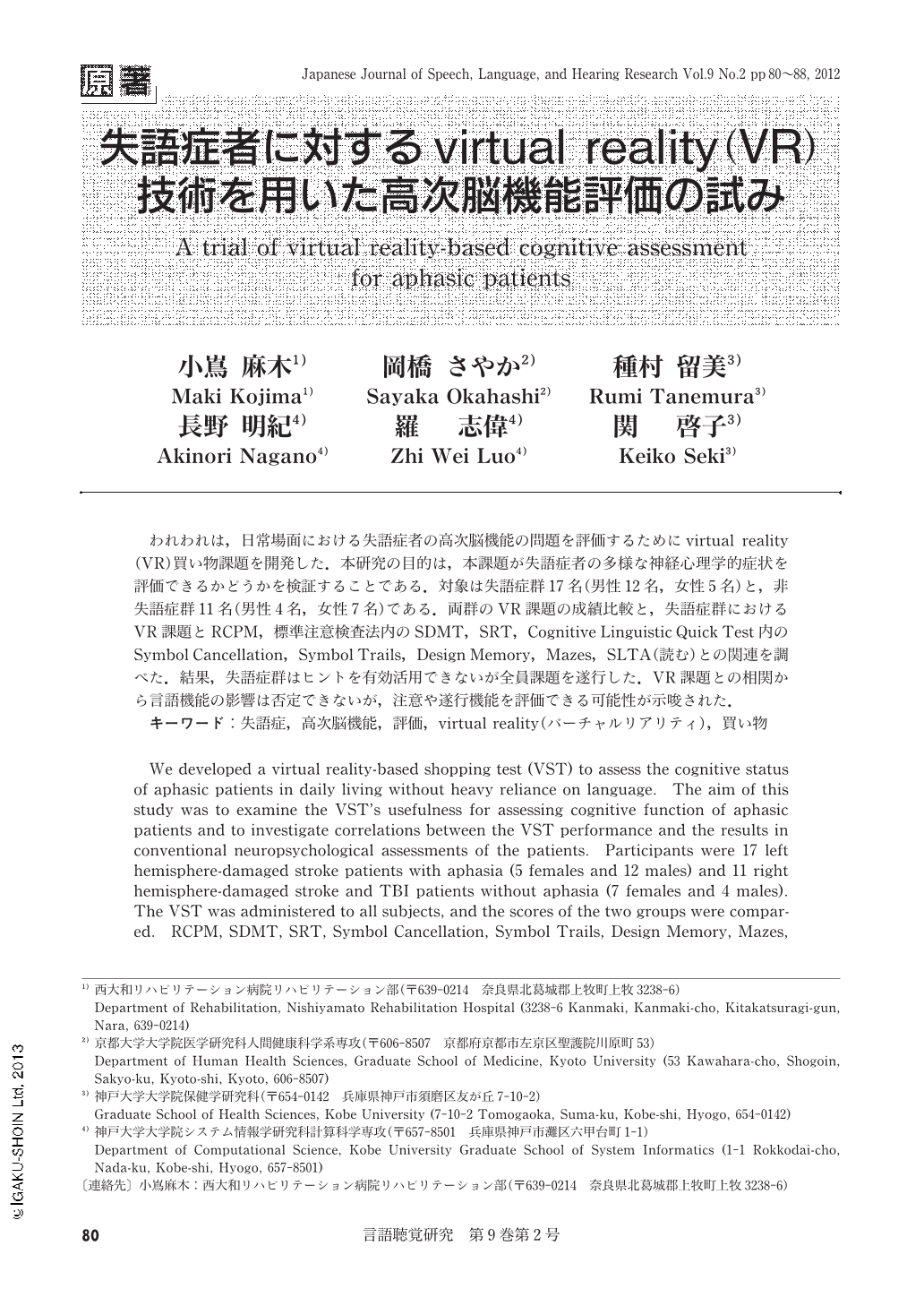- 著者
- 小嶌 麻木 岡橋 さやか 種村 留美 長野 明紀 羅 志偉 関 啓子
- 出版者
- 日本言語聴覚士協会
- 雑誌
- 言語聴覚研究 (ISSN:13495828)
- 巻号頁・発行日
- vol.9, no.2, pp.80-88, 2012-07-15
われわれは,日常場面における失語症者の高次脳機能の問題を評価するためにvirtual reality(VR)買い物課題を開発した.本研究の目的は,本課題が失語症者の多様な神経心理学的症状を評価できるかどうかを検証することである.対象は失語症群17名(男性12名,女性5名)と,非失語症群11名(男性4名,女性7名)である.両群のVR課題の成績比較と,失語症群におけるVR課題とRCPM,標準注意検査法内のSDMT,SRT,Cognitive Linguistic Quick Test内のSymbol Cancellation,Symbol Trails,Design Memory,Mazes,SLTA(読む)との関連を調べた.結果,失語症群はヒントを有効活用できないが全員課題を遂行した.VR課題との相関から言語機能の影響は否定できないが,注意や遂行機能を評価できる可能性が示唆された.
1 0 0 0 OA 低酸素脳症後の記憶障害に対する身体活動介入の効果:
- 著者
- 小嶌 麻木 中村 潤二 長野 明紀
- 出版者
- 一般社団法人 日本体育学会
- 雑誌
- 体育学研究 (ISSN:04846710)
- 巻号頁・発行日
- vol.63, no.2, pp.827-836, 2018-12-10 (Released:2018-12-20)
- 参考文献数
- 25
[Objective] Various methodologies have been employed for memory rehabilitation, such as environmental control, improvement of learning methods, compensatory strategy training, or group-based interventions based on the characteristics of the patients. In some cases, however, these approaches have been reported to be inappropriate for patients suffering from marked memory deficit. Therefore, new, more effective approaches for recovery of memory deficit are needed. Several previous studies have reported that physical activity and exercise can affect cognitive function. However, empirical evidence obtained from patients with memory deficit is still insufficient. The aim of this study was to clarify the effect of aerobic training on memory ability in a patient with memory deficit. [Methods] The subject was a 48-year-old, right-handed male with memory deficit subsequent to hypoxic encephalopathy. We used an A-B-A single-case experimental design. The word delayed recall task and word fluency task were conducted 10 times in each phase. During the baseline A and washout A-phases, after memorizing 3 words, the subject performed a paper and pencil task for 15 minutes, and thereafter recalled the 3 memorized words and performed the word fluency task. During the B-phase, after memorizing 3 words, the subject pedaled a bicycle ergometer at 50W for 15 minutes, and thereafter performed the recall and word fluency tasks. [Results] Average performance in the delayed recall task was 0±0 words in the baseline A-phase, 2.3±1.1 words in the B-phase, and 0.1±0.3 words in the washout A-phase (F(2,18)=37.098, p<0.0001). That in the word fluency task was 2.7±0.9 words in the baseline A-phase, 2.3±1.3 words in the B-phase, and 3.6±1.3 words in the washout A-phase. [Discussion] These results suggest that aerobic training can lead to recovery of memory deficit. However, although we were able to observe acute effects, comprehensive recovery of cognitive function was not achieved, and the long-term effect was not tested. Further research is needed in this area.
- 著者
- 小嶌 麻木 岡橋 さやか 羅 志偉 長野 明紀 酒井 弘美 関 啓子
- 出版者
- 一般社団法人 日本高次脳機能障害学会
- 雑誌
- 高次脳機能研究 (旧 失語症研究) (ISSN:13484818)
- 巻号頁・発行日
- vol.36, no.2, pp.296-303, 2016-06-30 (Released:2017-07-03)
- 参考文献数
- 18
失語症者の日常生活における包括的な認知機能の評価用として, Virtual Reality 技術を用いた Virtual Shopping Test-easy version ( VST-e) を開発し, 失語症者への適用および妥当性と信頼性を検討した。 VST-e において被験者は, 買い物内容を暗記した後, PC 画面のタッチパネル操作により仮想の商店街でなるべく速くかつ正確に買い物課題を行った。失語症者, 健常者各 20 名を対象に施行した結果, 失語症群は健常群より有意に買い物リスト参照回数と方向転換回数が多く, 所要時間が長かった。また, 失語症群の VST-e 成績は言語機能, 知的機能, 注意, 遂行機能との相関を認め, 内部一貫性に関する Cronbach の α は 0.62 であった。したがって, VST-e は言語機能の影響を受けるが, 基準関連妥当性と信頼性を有し, 失語症者の総合的認知機能検査として有用であることが示唆された。
